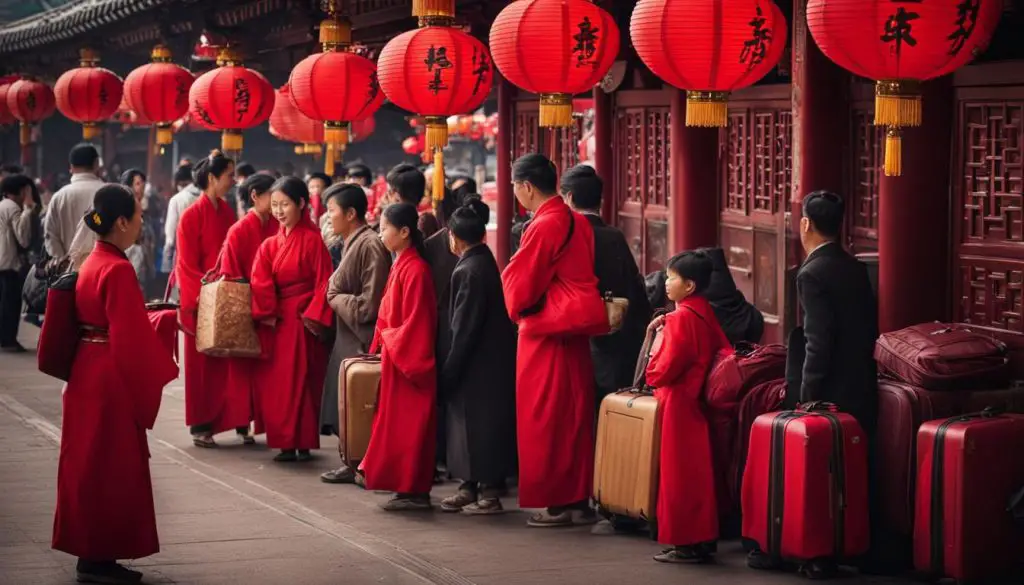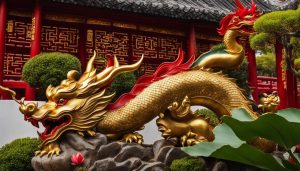The Lunar New Year, or Chinese New Year or Spring Festival, is a significant holiday in China and other Asian countries.
It is a time for families to come together and celebrate, but it is also a period filled with traditions and superstitions.
Many believe that vacationing during Chinese New Year’s can bring good or bad luck. Let’s explore the cultural beliefs and travel advice surrounding this question.
Contents [hide]
- 1 Lunar New Year Traditions and Superstitions
- 2 Traveling During Chinese New Year
- 3 Superstitions and Beliefs about Vacation During Chinese New Year
- 4 Cultural Insights and Travel Advice
- 5 Conclusion
- 6 FAQs
- 6.1 Is it good or bad luck to vacation during Chinese New Year’s?
- 6.2 What are some Lunar New Year traditions and superstitions?
- 6.3 What should I consider when traveling during Chinese New Year?
- 6.4 Are there any superstitions or beliefs about vacationing during Chinese New Year?
- 6.5 What cultural insights and travel advice should I be aware of?
- 7 Source Links
Key Takeaways:
- Vacation during Chinese New Year can be seen as either lucky or unlucky, depending on personal beliefs.
- Chinese New Year is marked by various traditions and superstitions, including using red for good luck and avoiding washing or cutting hair on the first day.
- Traveling during Chinese New Year can be challenging due to the many travelers, so planning and booking in advance is advisable.
- There are different beliefs about vacationing during Chinese New Year, with some viewing it as a refreshing break and others seeing it as missing out on traditional celebrations.
- Understanding and respecting the cultural insights surrounding the Chinese New Year can help make informed vacation decisions.
Going on vacation during Chinese New Year can be a personal choice influenced by cultural beliefs and individual preferences. While some may view it as good luck or an opportunity for new experiences, others may consider it inauspicious or miss traditional celebrations.
It is essential to consider cultural insights and travel advice when deciding about vacations during the Chinese New Year. By understanding and respecting the traditions and superstitions associated with this holiday, you can make the most of your vacation experience.
Lunar New Year Traditions and Superstitions
The Lunar New Year, Chinese New Year, or Spring Festival has rich traditions and superstitions. These cultural beliefs play a significant role in the celebrations and are passed down through generations.
Understanding these traditions and superstitions can provide insights into the significance of vacationing during the Chinese New Year.
During the Lunar New Year, red is essential as it symbolizes luck and prosperity. People often decorate their homes with red lanterns and wear red clothing during the festive period.
Another significant tradition is the act of setting off fireworks and firecrackers. This practice is believed to ward off evil spirits and bring good luck for the upcoming year.
“The Lunar New Year is a time for families to come together and celebrate.”
Food also plays a central role in Lunar New Year celebrations. Eating dumplings is considered a must-do tradition as it is believed to bring wealth and new beginnings.
Cleaning the home before the stroke of midnight is also essential, as it symbolizes getting rid of bad luck accumulated in the past year. Debts should be settled, and hair should not be washed or cut on the first day of the new year to avoid washing away fortune.
By following these traditions, individuals seek to ensure good luck, prosperity, and a fresh start for the new year. Depending on personal interpretations and perspectives, these cultural beliefs contribute to the perception of vacations during Chinese New Year as either lucky or unlucky.
Also read: Is It Good Luck to Wear Red Underwear on New Year’s Day?
Table: Lunar New Year Traditions and Superstitions
| Tradition | Symbolism |
|---|---|
| Red color | Luck and prosperity |
| Fireworks and firecrackers | Scaring away evil spirits |
| Dumplings | New beginnings and wealth |
| Cleaning the home | Getting rid of bad luck |
| Avoiding hair washing and cutting | Avoid washing away a fortune |
Traveling During Chinese New Year
Traveling during Chinese New Year can be a unique experience but requires careful consideration. The holiday is often associated with a week-long break in China, known as Spring Festival, which results in a massive influx of travelers. This can lead to crowded airports, trains, and highways, making it challenging to move around.
It is essential to plan and book accommodations and transportation in advance. Some people believe that traveling during Chinese New Year brings good luck, which symbolizes starting the year with new experiences.
However, others may view it as inauspicious, as it means being away from home and missing out on family gatherings. Ultimately, traveling during Chinese New Year depends on personal beliefs and preferences.
Also read: Is It Good Luck To Wear Red On New Year’s?
When traveling during Chinese New Year, it’s essential to be mindful of cultural customs and traditions. Embrace the festive spirit by participating in local celebrations and trying traditional foods. Take the time to learn about the holiday’s significance and show respect for the local culture.
Travel Advice for Chinese New Year:
- Plan and book accommodations and transportation in advance.
- Be prepared for crowded tourist destinations.
- Embrace the local culture and traditions.
- Participate in holiday festivities wherever you are.
By following these travel advice tips and respecting the cultural significance of Chinese New Year, you can have a meaningful vacation experience.

Table: Chinese New Year Travel Traditions
| Tradition | Significance |
|---|---|
| Plan and book in advance | Ensures availability and avoids last-minute stress |
| Embrace local celebrations | Experience the festive spirit and cultural traditions |
| Respect the local culture | Show appreciation for customs and beliefs |
| Participate in holiday festivities | Create memorable experiences and immerse in the local culture |
Superstitions and Beliefs about Vacation During Chinese New Year
Going on vacation during Chinese New Year is surrounded by various superstitions and beliefs. Some consider it lucky, believing it brings good fortune and new experiences.
Others view it as inauspicious, fearing it will take them away from traditional celebrations and family gatherings. These beliefs reflect the cultural significance of Chinese New Year and the importance placed on staying connected to one’s roots during this time.
For those who believe that vacationing during Chinese New Year is lucky, it represents a fresh start to the year with the opportunity to explore new places and create lasting memories. It is seen as a chance to break free from routine and welcome good luck into one’s life.
On the other hand, those who find it inauspicious may worry about missing out on the customary festivities and the potential negative consequences of being away from home during such an important holiday.
Ultimately, whether a vacation during Chinese New Year is considered lucky or unlucky depends on personal beliefs and cultural traditions.
Some may embrace superstitions and plan their vacations accordingly, while others may prioritize spending time with family and participating in traditional rituals.
Individuals can make informed decisions and create meaningful experiences during the Chinese New Year by understanding and respecting these beliefs.
Cultural Insights and Travel Advice
When considering a vacation during Chinese New Year, it is essential to gain cultural insights to make informed decisions.
Understanding and respecting the traditions and superstitions associated with this holiday can help you have a meaningful vacation experience. Here are some cultural insights to keep in mind:
- Red is an Auspicious Color: Red is considered a lucky color during Chinese New Year. Wearing red clothing or accessories can bring good luck and symbolize prosperity.
- Respect Local Customs and Traditions: Familiarize yourself with the local customs and traditions of the destination you plan to visit. Participating in holiday festivities and respecting local practices can enhance cultural understanding and enrich your vacation experience.
- Be Prepared for Crowded Tourist Destinations: Chinese New Year is a peak travel period in many Asian countries. Famous tourist attractions can get crowded, so planning your itinerary accordingly and being patient while navigating through overcrowded areas is advisable.
“Traveling during Chinese New Year can be an exciting adventure, but it requires careful planning and consideration of cultural beliefs.”
Travel Advice for Vacation During Chinese New Year
When it comes to travel advice for vacation during Chinese New Year, here are some tips to help you make the most of your trip:
- Plan: Chinese New Year is a busy travel season, so planning and booking your accommodations and transportation well in advance is essential to secure the best options.
- Expect Transportation Delays: With the increased travel during the Chinese New Year, transportation delays are expected. Be prepared for longer travel times and potential delays in flights, trains, and buses.
- Embrace the Festive Spirit: Take the opportunity to immerse yourself in the festive spirit of the Chinese New Year. Participate in traditional activities, try local delicacies, and soak in the atmosphere of celebration wherever you are.
| Cultural Insights | Travel Advice |
|---|---|
| Respect traditions and superstitions | Plan and book early |
| Familiarize yourself with local customs | Expect transportation delays |
| Embrace the festive spirit | Immerse yourself in the celebration |
By keeping these cultural insights and travel advice in mind, you can navigate the challenges and make the most of your vacation during Chinese New Year.
Whether you travel during this time or not, respecting the traditions and superstitions associated with the holiday is essential. Embrace the festive spirit and enjoy the rich cultural experiences of Chinese New Year.
Conclusion
Deciding whether to vacation during the Chinese New Year concerns personal beliefs and preferences.
Some view it as an opportunity for good luck and starting the year with fresh experiences, while others may consider it inauspicious or miss out on traditional celebrations. Regardless of your choice, it’s essential to understand and respect the cultural insights surrounding this holiday.
Careful planning is critical if you travel during the Chinese New Year. Booking accommodations and transportation well in advance can help you navigate the crowded tourist destinations that are common during this time.
It’s also worth immersing yourself in the local customs and traditions wherever you go, giving you a more meaningful vacation experience.
By considering the cultural significance of Chinese New Year and the advice provided, you can make an informed decision that aligns with your beliefs and ensures an enjoyable vacation.
Whether you vacation or stay home, may you have a prosperous and joyous Lunar New Year!
FAQs
Is it good or bad luck to vacation during Chinese New Year’s?
Cultural beliefs and personal preferences vary. Some view it as good luck, symbolizing a fresh start and new experiences, while others may consider it inauspicious or miss out on traditional celebrations.
What are some Lunar New Year traditions and superstitions?
Lunar New Year traditions include cleaning the home before midnight, eating dumplings for wealth, setting off fireworks to scare away evil spirits, and avoiding washing or cutting hair on the first day of the new year. Red is considered a lucky color.
What should I consider when traveling during Chinese New Year?
Traveling during Chinese New Year can be challenging due to crowded airports, trains, and highways. It is essential to plan and book accommodations and transportation in advance. Being prepared for crowded tourist destinations is also necessary.
Are there any superstitions or beliefs about vacationing during Chinese New Year?
Some believe that vacationing during Chinese New Year brings good luck, while others may see it as inauspicious or missing out on traditional celebrations. It is essential to consider cultural beliefs when making decisions.
What cultural insights and travel advice should I be aware of?
Respecting the traditions and superstitions associated with Chinese New Year is essential. Planning, embracing local customs, and participating in holiday festivities can enhance your vacation experience.





